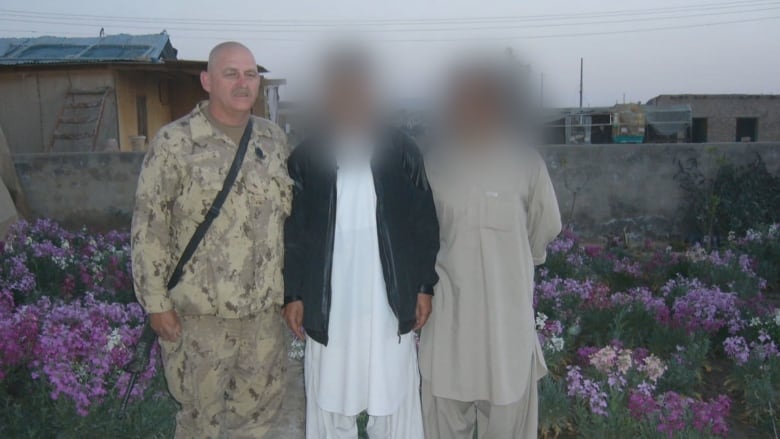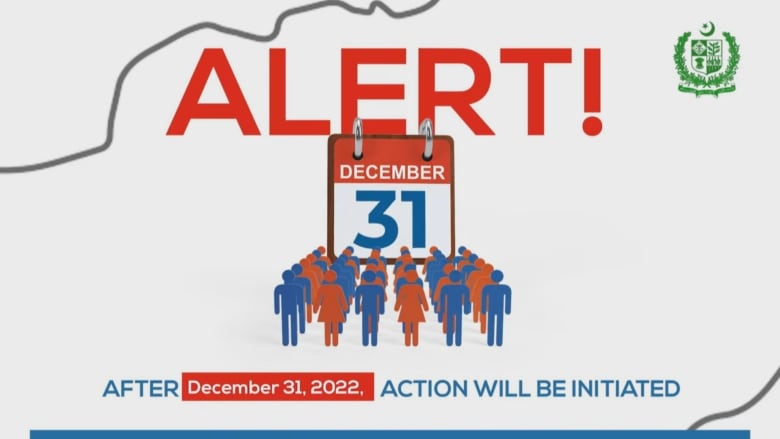
In an apparent reversal from an announcement this fall, Pakistan’s government has told Immigration, Refugees and Citizenship Canada it will not deport paperless Afghan migrants or throw them in jail after the end of this month, but rather impose fines or perhaps a ban on their return to Pakistan.
“The Government of Pakistan has indicated that the only enforcement action that could be taken against foreigners overstaying their visas will be the re-imposition of fines and potentially being blacklisted from returning to Pakistan,” the Immigration Department said in a statement to CBC.
As a country neighbouring Afghanistan, Pakistan has been a go-to destination for Afghan migrants hoping to qualify for Canada’s resettlement program. Twenty-one charter flights carrying Afghans from Islamabad have come to Canada this year, according to IRCC.
In October, Pakistan’s Ministry of the Interior had started running ads on television and social media telling migrants to the country whose visas had expired that they would risk deportation or jail time after Dec. 31, 2022.
Those ads did not explicitly target any ethnicity but ran in Urdu, Pakistan’s national language, as well as Pashto and Dari, two languages that are commonly spoken by Afghans.
In November, Pakistan’s High Commission in Ottawa told CBC News that Afghans with valid visas/documents for onward travel would be “facilitated by the government of Pakistan.”
This latest change comes as the country’s relationship with Afghanistan has deteriorated. Pakistan continued to hold diplomatic ties with the Taliban after it took over Kabul in September 2021.
But since last month, the two countries have been involved in border clashes. As well, inmates belonging to a Pakistan off-shoot of the Taliban took over a Pakistani jail and there was a gunfire attack on Pakistan’s embassy in Kabul.
Pakistan caught in ‘murky politics:’ expert

With no sense of how much worse the conflict could get, one observer of the region said migrants could well remain in limbo.
“The murky politics of the region are now coming home to roost for Pakistan,” said Elliot Tepper, a professor of international relations at Carleton University in Ottawa.
He said Islamabad supported the Taliban for years until the latter’s return to power in 2021, hoping to foster a regional ally.
“They thought they were buying that strategic depth, the friend in Kabul that they required,” he said. “Now that the Taliban are back in power, they are looking after their own traditional interests, and those interests conflict with Pakistan’s.”
Tepper said this has left Afghan migrants who were former Canadian military personnel in the lurch.
“The people who have helped us materially … those that we owe, that we have an obligation to, and people in Canada are working to assist, they are paying the cost of this politics between the powers of Afghanistan and Pakistan,” he said.
Migrants concerned
Between the government ad, the uncertainty over the conflict between the two countries and the long wait for Immigration Canada to process their applications to fly to Canada, some migrants were still worried.
“We are waiting and waiting for the email [for] when will we be able to get our flights,” said one former Canadian military interpreter living in Islamabad with his wife and 10 children.
CBC News has agreed not to name him, as his brothers, who also served with the Canadian military, are still living in Kandahar City.
All of them are targets of the Taliban.

He and his immediate family moved to Islamabad in May, arriving legally on visas that cost him $6,000 US in savings.
But he has been unable to renew the paperwork after it expired, and other expenses piled up with no income, as he does not have the right to work in Pakistan.
“The money which I had, I just spent the whole money on [the family],” he said, enumerating “shoes, clothes, medicine or buying fruits or buying something for the kids.”
The interpreter has completed his application to Canada and is now waiting to see whether he will be accepted or rejected.
Returning to Afghanistan ‘is suicide’
Mohammad Younas Nasimi has been waiting longer, having arrived in Islamabad with his family last year.
The former Canadian military contractor said he cannot keep up that wait, as he eyed the Dec. 31 deadline.
Rather than risk jail for him and his family in Pakistan, or all of them being handed over to the Taliban, he said he will sneak back across the border alone.
“I know that going back … is suicide,” he said. But he believes he faces better chances eking out a living for his wife and six children in Afghanistan.
Nasimi has been corresponding with the Canadian Embassy in Abu Dhabi over his immigration file for months, always receiving replies telling him his case was still being processed.
He showed CBC News an embassy answer to one of his last emails, where he had let them know he was thinking of going back to Afghanistan, and asking for advice.
“We are sorry to hear about the very challenging circumstances,” the embassy had written back.
“We encourage you to take whatever lawful steps you deem necessary outside of this application, to provide for the safety and security of yourselves and your family.”